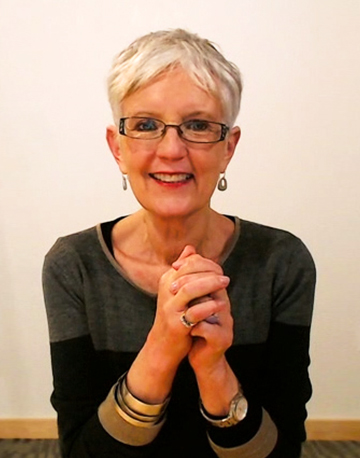How to Work with Patients Whose Trauma Triggers Problems in Their Current Relationships
 |
with Stephen Porges, PhD;
|
 |
with Stephen Porges, PhD; Terry Real, MSW, LICSW;
Janina Fisher, PhD Richard; Schwartz, PhD; Pat Ogden, PhD; Martha Sweezy, PhD, LICSW; Bessel van der Kolk, MD; Ruth Lanius, MD, PhD; Deb Dana, LCSW; Thema Bryant-Davis, PhD; Ruth Buczynski, PhD
Sign up for a Gold Membership

This is a learning community for practitioners. We can’t wait to hear what you’re going to use with your clients
But please do NOT:
- seek advice for personal problems
- ask for referrals
- post links or advertise a product
- post about technical problems
Thank you all for this wonderful series. For me the most important thing is an awareness of the many other possibilities there are for my clients’ lives both in their past and for their futures.
I am new in the counseling field and am so grateful for this program. I can’t afford right now to purchase the package. I wish I could. I have learned much and will be incorporating it into my practice. Thank you again.
What an amazing series, thank you to all involved. I’m off to change the world starting with me!???
Thank you so much for this programme. I have learned so much.
Thank you so much for providing this programme I really appreciate it ❤️
As pastor, I am finding the need to be attentive and aware of the language used. Thank you. KatieD+
Thank you so much for putting this together, I loved the last three sessions, I missed the first two. I learned so many invaluable gems. The adaptive child stands out from tonight’s web. I spent many years in therapy going to at least half a dozen different therapists and wondered why “they kept missing me, in my true essence”……I know now that they didn’t understand trauma and the traumatised child. A retired psychotherapist myself, I have more work to do now on myself. I am very grateful for these webinars.
1, Compulsion to repeat is beautifully illustrated in our patients adult relationships.
Just Yesterday I observed it repeat it self during the session and ‘Resolve’ itself infront of my very eyes, before the end of the session .The patient was executing the new integrated approach so smoothly without a hitch, that I felt extremely privileged to be part of it.
2, I also agree that neglect is harder to work with than abuse and for patient to accept any compassion for their shameful rage for a victimized timid mother/ The other absent parent.
I have bought the series but enjoy following it every week, especially the comments and insight of other Experienced
Practitioners.
Congratulations for the success and with gratitude,
“When you help someone heal from trauma, you help change the course of civilization.” ~ Ruth Buczynski. Bravo. This is why I contend that mainstream trauma awareness and literacy is essential. When we become aware of the prevalence of trauma outcomes and how they drive our behaviors and those of others, we can reorient our social to one of compassionate witnessing versus judgmental stigmatizing. This is why I have become a truama-literacy advocate. Each of the participants in this course have made great contributions to this effort. Thank you.
“We can reorient our social RESPNSE to one of compassionate witnessing…” I beg your pardon.
I have watched and learnt so much from all these modules. I am sure it will help me with my client work. I am very grateful for the free webcasts as I am earning very little at present because I have had very few clients for the past few months as I am not able to work face to face until there is a vaccine for Covid-19.
Many many thanks.
Margaret Goillon (UKCP Reg. Psychotherapist)
Surrey, England
I’m passionate about Presence and inner witnessing, and holding space for people to explore and develop their capacity to develop these in themselves. This seminar is helping me see that trauma might well be lying beneath the surface for people who find it difficult to relate with the present and their inner witness and some ideas for how to relate with them without becoming their therapist (since I’m not a psychotherapist). Thank-you for this series. It’s also helping me reframe my own patterns and traumatic experiences by supporting my disidentification through gaining deeper understanding through the psychoeducation – something I don’t remember receiving in years of personal psychotherapy!!
Take aways.
The two diffetent kinds of trauma – violation and abandonment.
The application of the principles of good parenting to the full spectrum of aspects of life.
The teenage protector – understanding can help him or her not be in control – the self taking control rather than emergrncy services!
The fictional persona shown to the Other in affairs can give a feeling of power not felt in default relationship.
Be there for your client snd know your power.
Compassion.
Re-enactment behaviours – ways to enable the Self to observe them.
Look into Disorgsnised attachment further. The body makes the choice.
Communicate. Lay the ground. Grounding.
Even coming from a business setting, I am very grateful for the insights presented and shared in this wonderful series. For conflict and leadership coaching, I find the idea of ‘rupture and repair’ very helpful because I find that many of the problems at work stem from personal wounds shutting down leaders’ abilities to socially engage with their teams. Also, introducing and working with the adaptive vs. wounded child is enlightening and sounds more convincing than pure inner child work.
Thanks so much for your generosity and excellent work!
I think there are several more showings between today and tomorrow, 5p, 8p and 11p EST today. Not sure of the times tomorrow.
Thank you for all the series, they have been very informative for me, got a lot of very useful answers and approaches. I already see the effect in my practice. I particularly found useful the perspective on new responses beyond fight/flight/freeze and the work with parts. Thank you all!
As a newly qualified occupational therapist I hope to implement quite a bit of these tips in my first job in mental health. Thank you for enlightening us all. I’ve watched all five sessions but this last one gave me some understanding of what my partner went through as a child. Best wishes and keep these webinars coming :-).
Thank you – this was helpful. I am not a therapist, I’m the mother of an adopted child, and I would love to see a series on how to treat the trauma of children who were abandoned as babies and then adopted. I’d love for Nancy Verrier to be part of that. – Sarah, Durham, NC
Thank you very much! This body of work is outstanding, meaningful, and useful! The expertise is phenomenal.
This is outstanding work, thank you for sharing it! I have finished a Traumatherapy three-year program in Germany and could easily relate to the material shared here. Comparing it – it comes with richer details that could be very insightful and practically very useful with clients. Thank you once more for sharing this diverse and rich collaboration.
An ex partner of mine told me about his childhood abuse and ongoing trauma. I became the butt and cause of his anger and although i knew this was part of his past traumatic experience it was too difficult to cope with. . I wish i knew then what i know now as could have made more sense of his behaviour and reacted differently, to perhaps help him. . thank you
Thank you for sharing – I don’t feel quite so alone. I’m just coming out of a 20 year relationship exactly as you describe! I have been following this series (as a non-practitioner) to try and gain insights into, and potential healing of my resulting distress and trauma, and feelings of shame and defectiveness. As well as helping me appreciate why I struggled and was triggered, like you, it’s given me an appreciation of my husband’s struggles. So yes, maybe I could have reacted differently too.
grateful thanks to everyone at nicabm for putting together this course!
The adaptive child becomes our chronic action behavioral patterns. Attending to that part of ourselves and our patients seems so hopeful for transformation. Perhaps this part is the hardest to change because it helped out patients survive and they side with that part in berating their wounded child. I also appreciate the brief mention of “who did you hurt” because this gets to the root of so many of our oppressive habits around white racism, male domination, adultism, belittling of the working class, etc. Thanks so much. I have a zillion questions
This has been a wonderful series! Thank you for all you do! It is so helpful to come to know and love ourselves — and the practitioners all focus toward this coming to a place of acceptance and love within. To come to see that all parts of us have a purpose and all developed to protect us is very helpful. I use that with clients often.
It was very enlightening session
Especially how early relationship did work as a lens to see the current relationship but it also mean how the current relationship could be turned into opportunity to nurture and repaire early relationship injuries as well as grow in the present relationship
This is outstanding work, thank you for sharing it! I have finished a Traumatherapy three-year program in Germany and could easily relate to the material shared here. Comparing it – it comes with richer details that could be very insightful and practically very useful with clients. Thank you once more for sharing this diverse and rich collaboration.
This was excellent, very validating. I wish I had the time to have watched the other sessions of this series. I wish I could afford to purchase the series I believe it is a wonderful value for those that can. Thank you for making todays session available for free.
Thank you. I am not a practitioner but got a lot from hearing about coping mechanisms and their eventual effects. It gave me more choices.
The program seems helpful but out of my price range.
Thank you very much! This has been amazing and very valuable for me!
Thank you! Great work!
Thank you for welcoming me. It has been a transformative experience to work these exceptional people, exceptional ideas, and such great compassion.
Lauryn Beltz
This was really helpful and a great session. I especially liked the part talking about having compassion for the child-self who was wounded or abused and how we bring this “child” into our adult relationships, and the impact it can have. I do wish that the therapist who shared about the child “in prostitution” would label it differently since there is no thing as a “child prostitute” and correctly label it child sex-trafficking. I work with minors who have been trafficked and that terminology change goes a long way 🙂
Overall, wonderful session with so much to glean.
This one on trauma and relationships was so valuable and informative, like all the others in working with clients who have had trauma either through abuse or neglect and how to help clients understand the function and purpose those different parts played and how it continues to play out in their life and relationships, including the relationship with their therapist. And how they continue to repeat those patterns until they feel safe to practice more healthy behaviors. I love the mindfulness and body awareness and the use of curiosity and open ended questions to help client’s start to become more aware slowly and experiment with different ways of being. Thanks to all of you for the amazing webinars. I’m going to get the gold package.
Noreen Rios LMFT
Hello, Thank you for this information. I heard the last two sessions. I’m not a therapist; been on a healing journey for over 40 years. While I’ve been an awakened observer for awhile, these sessions gave me a deeper understanding of my “wounds” and maladaptive behavior. Especially of value was receiving tools to transform behavior. These talks illuminated the path to living a healthy happy life. Eternally grateful to each and everyone of you. May you be blessed. PS – the Field I practice in is not listed. I’m a holistic private chef growing into a transformational coach (and minister). I believe food preparation provides a rich opportunity to engage all the senses and stay present in the moment. First I had to face my fears and behaviors around food and eating. Now I know thru experience, cooking is a sacred daily practice and a path for healing trauma. I’m healing from Complex Developmental Trauma including both violent intrusion and neglect/abandonment. I did not have that clarity before. THANK YOU so very much!
I have several male friends who were abused as children and this unit has really helped me understand some of the repeated patterns of conflict we have in our relationships and given me some ideas for how I might begin to change those patterns especially the ideas around the parts of wounded child and adaptive teenager
And the whole course has given me more insight into the psychobiology behind the dance practice that I used for my own healing and now teach to others. I am curious to learn how this expanded understanding will impact my teaching … once we can get back on the dance floor
Thank you
Thank you so much. I missed the first session but the rest have been so helpful and given me some great tools and ideas for how to work with my clients. It has helped me see things from alternative perspectives and frame things in different ways. I want my clients to experience the benefits of my learning and have already started using elements from these sessions.
I thoroughly enjoyed this session today and will take much from it.
I was particularly drawn to Janina’s ‘story’ about the couple bringing their individual ‘child selves’ into their relationship. This will inform my work with couples in the future.
I also found Thema’s content regarding male sexual abuse victims incredibly enlightening and will definitely use her questioning techniques in my practice.
Thank you for an informative, comprehensive session.
Very practical points were shared. One that stuck with me: Why clients seem to have a pattern of preferring the bad boy partner. It’s because when things are dangerous, attachment seeking is heightened, for safety. on the hand, when the other part is a safe, good guy, one part can think that it’s not real and wants to flee, the radars looking for danger come up too.
This session helped me understand how one of my clients acted from their implicit memory of trauma in their current relationship, and a lot of it stemmed from shame. I would focus my work on addressing these in the following sessions.
Thank you for the wonderful five weeks! It has been a great learning experience.
Love the discussion of what good parenting involves, effects of male sexual abuse, and speaking FOR a part rather than FROM a part. That’s really useful language to use!
Thank you for such informative work you have done, I understand my own situation much better as TraumI was abused as a child and I am trying to get better services to help others in my area of Norfolk England as Trauma work is very sparse here and it leaves people in pain
thank you so much for your generosity in these 5 sessions. I have used some of the handouts already with clts. The last comment about how the ripple effect can not only help our clients but their partners and children, confirmed how powerful this therapeutic healing can be.
Love the highlighting that sometimes even positive change is resisted in individuals and couples. Also liked the visual of the triangles and shapes for young and teenage child, and the stress on how power relationships and culture can affect a client’s access to their own ‘truths’. Thanks, such a great series.
Thank you for this excellent program. It was a great summary of what I have been studying in the trauma field for many years. I appreciated all the many experts and their points of view and how it all comes together.
Safety is danger. Danger is safety. Women are not choosing. It’s the automatic unconscious response and survival strategy from the past
Wonderful series
Thank you for sharing your vast knowledge and wisdom
This was wonderful, thank you. I particularly appreciated the discussion on helping couples help each other by how they respond to their own and each others’ trauma responses. Healing happens in relationships, and it’s so much more helpful, I think, to teach people how to do therapeutic work in their everyday interactions with significant others, not only in therapy.
Loved this! Totally worth watching on my day off. Sad that I only caught the last one. Just asked my job if they could help pay for Gold Package.
Thank you once again for a great webinar
Thank you very much. A world of wisdom.
Thank you for all your work. I´ve learned so much, especially being given names for and different ways of thinking about processes will be very useful.